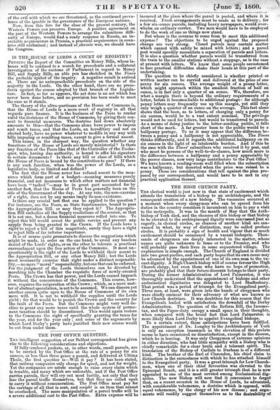THE POST OFFICE QUESTION.
TEE intelligent suggestion of our Belfast correspondent has given rise to the following considerations and objections. If fully-enclosed packets, or, in other words, small parcels, are to be carried by the Post Office at the rate of a penny for six ounces, or less than three pence a pound, and delivered at Ultima Thule, the first question is—Will it pay ? It has been stated, that railway companies only charge for speed, and not for weight. Yet the companies are astute enough to raise every claim which is tenable, and many which are untenable, and if the Post Office carries parcels, they will cry out most lustily, not only that they lose the parcel traffic themselves, but that they are called upon to carry it without remuneration. The Post Office must pay for. the carriage of all that is sent, and weight is an item that cannot be overlooked. The mere manipulation of a parcel traffic will be a severe additional cost to the Post Office. Extra expense will be incurred at the place where the parcel is posted, and where it is received. Fresh arrangements must be made as to delivery; for a few six-ounce parcels, including heavy newspapers, would- over- whelm an ordinary carrier. Two men would have to be employed to do the work of one as things now stand.
But where is the revenue to come from to meet this additional expense ? The objections to be urged against the proposed change are very strong. Closed parcels may contain matter which cannot with safety be mixed with letters ; and a parcel post would speedily necessitate a separation of parcels and letters. It is also a question whether parcels would be transferred from the train to the smaller stations without a stoppage, as is the ease at present with letters. We know that some people accustomed to face practical difficulties shake their heads at this part of the undertaking.
The question to be chiefly considered is whether printed or written matter can be carried and delivered at the price of one penny for six ounces. The average weight of a penny letter, which might approach within the smallest fraction of half an ounce, is in fact only a quarter of an ounce. We, therefore, see what a margin there is beyond the ordinary requirements of a letter, before it becomes liable to additional postage : for although penny letters may frequently use up this margin, yet still they only weigh a quarter of an ounce on the average. This fact alone shows that the boon, as to letters, of charging only a penny for six ounces, would be to a vast extent nominal. The privilege would not be used for letters, but would be transferred to parcels. As a means of doing justice to the letter-sending public, it falls short of the mark. A far greater boon to the public wod be a halfpenny postage. To us it may appear that the difference be- tween a penny and a halfpenny is not appreciable. The Times thinks differently, and it regards the additional halfpenny on its six ounces in the light of an intolerable burden. And if this be the case with the 1imes' subscribers who received it by post, and who must be persons of the well-to-do-classes, how much more is the difference between a halfpenny and a penny appreciable by the poorer classes, now very large contributors 'to the Pest Office ! We have known a reading-room well filled when the subscription was a halfpenny, but deserted when the price was raised to a penny. These are considerations that tell against the plan pro- posed by our correspondent, and would have to be met in any practical application thereof.


























 Previous page
Previous page